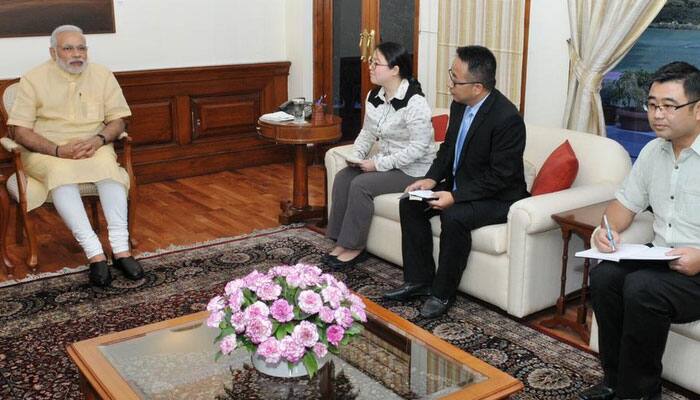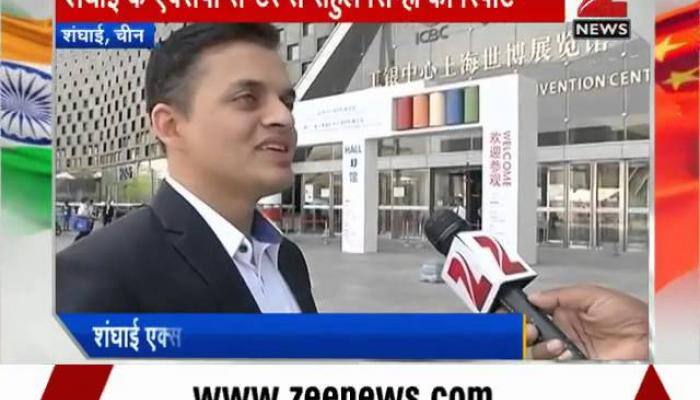New Delhi: Ahead of his much-awaited trip to China, Prime Minister Narendra Modi on Tuesday highlighted the potential of ties between New Delhi and Beijing.
The PM interacted with the Chinese media yesterday and asserted that India and China, involved in a boundary dispute, should promote peace and friendship.
Asia, being the land of Buddha, has the responsibility to ensure that this is a century free from war, underlined the PM.
"I am looking forward to the trip to China... the 21st century belongs to Asia," the PM said to China's CCTV ahead of his visit.
The Prime Minister, who spoke in Hindi, hoped that his visit will "further deepen" India-China relations and set "new milestone" for Asia and developing countries.
"I believe that my trip to China will not only deepen the China-India friendship, but also set new milestone for the relations between developing countries in Asia as well as around the world. There is no doubt about that," he told CCTV.
While interacting with the Chinese media, the PM also talked about India and China's shared responsibility to help developing nations, especially in the area of poverty eradication.
Faced with irritants like the boundary issue and China's plans for infrastructure projects in Pakistan-occupied Kashmir (PoK), Prime Minister Narendra Modi will have a tough task as he meets the Chinese leadership.
Exuding confidence that the ties between India and China will improve, Modi said the two countries will send the message together.
Prime Minister Narendra Modi has said that he wants to work on a roadmap to qualitatively upgrade economic relations with China. He also said that he was open to discussing regional connectivity, including the Silk Road concept, with Chinese leaders.
"I look forward to working out a roadmap for qualitatively upgrading our economic relations and seek greater Chinese participation in India's economic growth, especially in transforming India's manufacturing sector and infrastructure," Modi said on the eve of his visit to China.
Modi noted that he had met China's President Xi Jinping three times during the last one year and held extensive talks on a wide range of issues.
This is first time since Xi took over power two years ago that he will be receiving a foreign leader outside Beijing and will spend considerable time informally interacting with Modi.
On the potential cooperation between India and China on the "Silk Belt and Road" economic cooperation plan, Modi said that since ancient times, Asia has been connected in a variety of ways by land and sea.
"Today, a re-emerging Asia must reconnect its many regions and with the world beyond. Like China, India too is seeking to strengthen connectivity to the East and West. India and China are also working together on Bangladesh, China, India and Myanmar Corridor," he said.
The Prime Minister said this would be one of the issues that he expected to discuss with Chinese leaders.
Regarding cooperation on the Asian Infrastructure and Investment Bank (AIIB), the Prime Minister said India and China have been cooperating since last year in creating the AIIB.
"We welcome the initiative that can play a role in meeting some of the large demands for infrastructure development in our region. This is an example of expanding cooperation," he said.
On India's participation in the Shanghai Cooperation Organization (SCO) as a full member, Modi said his government hoped to intensify its engagement with the SCO in the coming years, especially in the spheres of economic development, energy cooperation and counter-terrorism.
The PM also spoke to media of South Korea and said there could be no better partner than Seoul for 'Make in India' initiative.
He also spoke about leveraging the manufacturing strength of South Korea, with India's young human resource base.
Trouble in India-China ties
The PM is undertaking six-day trip to China, Mongolia and South Korea beginning on May 14.
The list of problems both India and China face is considerable, ranging from the festering border dispute to China's support for India's arch-rival Pakistan.
President Xi had during his visit to Pakistan on April 20 announced a USD 46 billion package to construct infrastructure including highways and hydel power projects along the China-Pakistan Economic Corridor through PoK to the Gwadar port in Balochistan.
New Delhi has lodged a protest with Beijing over the China-Pakistan economic corridor. Serious differences continue to prevail on the border issue even as both sides are making efforts to ensure that peace and tranquillity prevails.
China is not keen on the clarification of the Line of Actual Control (LAC) proposed by Modi last year during the Chinese President's visit.
The clarification of LAC ahead of the resolution of the boundary was expected to restrict aggressive patrolling from both sides.
Two incursions by the Chinese troops in the Ladakh area during Premier Li Keqiang and Xi's visits to India in the last two years overshadowed the trips.
The incidents prompted Modi to suggest to Xi last year that clarification of LAC would greatly contribute in efforts to maintain peace and tranquillity of the border where troops from both sides often jostle to assert their claims and counter claims.
The issue was also discussed during the 18th round of the border talks held in March this year.
China says the border dispute is confined only to 2,000 km mostly in Arunachal Pradesh whereas India asserts that the dispute covered the western side of the border spanning to about 4,000 km, especially the Aksai Chin area annexed by China in the 1962 war.
Besides having restricted talks with Modi, in his native Xi'an city, Xi would take him on a tour of the iconic Wild Goose Pagoda built in 6th century AD in recognition of monk Xuan Zang's contribution in popularising Buddhism.
The visit to the spiritual structure assumes significance as Xuan undertook a journey to India in 645 AD through the ancient Silk Road and returned home after a 17-year-long sojourn with precious Buddhist scriptures.
Modi would also be given a traditional Chinese imperial Tang dynasty welcome before the two leaders settle for a banquet.
In all, the two leaders are expected to have threadbare discussions on the border issue, China's push for Maritime Silk Road (MSR) project over which India has reservations and India's big push for Chinese investments which will not happen without the nod from Beijing.
China has already announced USD 40 billion fund for the silk road projects.
From Xi'an, Modi will fly to Beijing where he will hold extensive talks with Premier Li Keqiang on the entire gamut of bilateral ties.
"A full range of political issues would be discussed - bilateral ties, regional issues, multilateral issues. Not just political matters but economic issues will also come up, issues relating to trade, investment to our collaboration on infrastructure projects, and I think a broader set of people-to-people contact-related issues," Foreign Secretary S Jaishankar said on the eve of the visit.
Both sides will sign an agreement to bolster trade, investment and other diverse areas. During Modi's stay in Beijing, the first meeting of the
India-China State and Provincial Leaders' Forum would be held attended by Chief Ministers of Maharashtra and Gujarat Devendra Fadnavis and Anandiben Patel respectively.
The Prime Minister will also witness a Yoga-Tai Chi joint event at the Temple of Heaven and deliver a public address at the Tsinghua University in Beijing.
The Prime Minister will have a business stop at Shanghai where he will meet Chinese CEOs, visit the Fudan University where he will inaugurate the Centre for Gandhian Studies. He will also be addressing a community event in Shanghai.
On the second leg of his visit, Modi will reach Mongolia on May 17. "There is a rare honour being bestowed on our Prime Minister because this is for the first time on a holiday the Parliament of Mongolia is going to allow a foreign leader to speak and address the membership there," said Anil Wadhwa, Secretary (East).
The Prime Minister will meet Mongolian President Tsakhiagiin Elbegdorj to strengthen bilateral cooperation in diverse areas.
The two sides will ink several agreements including one on application of nuclear technology for cancer cure, solar and wind energy, traditional systems of medicine and homeopathy, cyber security and other areas.
The Prime Minister will also attend a mini Naadam festival which includes display of horse racing, traditional wrestling and archery.
This will be the first ever visit of an Indian Prime Minister to Mongolia and takes place in the backdrop of celebrations of the 25th year of democracy in Mongolia and 60 years of its diplomatic relations with India.
Moving to South Korea on the last leg of his three-nation visit, Modi will meet President Park Geun-hye, followed by signing of several agreements including one on Double Taxation Avoidance Convention, shipping, transport, highways, electric power development and other areas. He will also address an Indian community reception.
Bilateral trade is currently at about USD 16 billion. There are 300 Korean companies who have invested USD 3 billion in India and employ 40,000 workers. Indian investment in Korea is close to USD 2 billion and it is looking forward to greater access in Korea to pharmaceutical and IT products.
The Prime Minister returns to Delhi from Seoul on May 19.
(With Agency inputs)


















